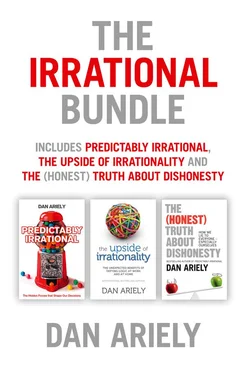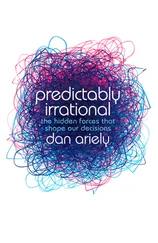Dan Ariely - The Irrational Bundle
Здесь есть возможность читать онлайн «Dan Ariely - The Irrational Bundle» — ознакомительный отрывок электронной книги совершенно бесплатно, а после прочтения отрывка купить полную версию. В некоторых случаях можно слушать аудио, скачать через торрент в формате fb2 и присутствует краткое содержание. Жанр: unrecognised, на английском языке. Описание произведения, (предисловие) а так же отзывы посетителей доступны на портале библиотеки ЛибКат.
- Название:The Irrational Bundle
- Автор:
- Жанр:
- Год:неизвестен
- ISBN:нет данных
- Рейтинг книги:3 / 5. Голосов: 1
-
Избранное:Добавить в избранное
- Отзывы:
-
Ваша оценка:
- 60
- 1
- 2
- 3
- 4
- 5
The Irrational Bundle: краткое содержание, описание и аннотация
Предлагаем к чтению аннотацию, описание, краткое содержание или предисловие (зависит от того, что написал сам автор книги «The Irrational Bundle»). Если вы не нашли необходимую информацию о книге — напишите в комментариях, мы постараемся отыскать её.
The Irrational Bundle — читать онлайн ознакомительный отрывок
Ниже представлен текст книги, разбитый по страницам. Система сохранения места последней прочитанной страницы, позволяет с удобством читать онлайн бесплатно книгу «The Irrational Bundle», без необходимости каждый раз заново искать на чём Вы остановились. Поставьте закладку, и сможете в любой момент перейти на страницу, на которой закончили чтение.
Интервал:
Закладка:
BUT WHAT WOULD HAPPEN if we mixed the signals for the two types of norms? What would happen if we blended the market norm with the social norm? In other words, if we said that we would give them a “50-cent Snickers bar” or a “five-dollar box of Godiva chocolates,” what would the participants do? Would a “50-cent Snickers bar” make our participants work as hard as a “Snickers bar” made them work; or would it make them work halfheartedly, as the 50-cents made them work? Or would it be somewhere in the middle? The next experiment tested these ideas.
As it turned out, the participants were not motivated to work at all when they got the 50-cent Snickers bar, and in fact the effort they invested was the same as when they got a payment of 50 cents. They reacted to the explicitly priced gift in exactly the way they reacted to cash, and the gift no longer invoked social norms—by the mention of its cost, the gift had passed into the realm of market norms.
By the way, we replicated the setup later when we asked passersby whether they would help us unload a sofa from a truck. We found the same results. People are willing to work free, and they are willing to work for a reasonable wage; but offer them just a small payment and they will walk away. Gifts are also effective for sofas, and offering people a gift, even a small one, is sufficient to get them to help; but mention what the gift cost you, and you will see the back of them faster than you can say market norms.
THESE RESULTS SHOW that for market norms to emerge, it is sufficient to mention money (even when no money changes hands). But, of course, market norms are not just about effort—they relate to a broad range of behaviors, including self-reliance, helping, and individualism. Would simply getting people to think about money influence them to behave differently in these respects? This premise was explored in a set of fantastic experiments by Kathleen Vohs (a professor at the University of Minnesota), Nicole Mead (a graduate student at Florida State University), and Miranda Goode (a graduate student at the University of British Columbia).
They asked the participants in their experiments to complete a “scrambled-sentence task,” that is, to rearrange sets of words to form sentences. For the participants in one group, the task was based on neutral sentences (for example, “It’s cold outside”); for the other group, the task was based on sentences or phrases related to money (for example, “High-paying salary” * Конец ознакомительного фрагмента. Текст предоставлен ООО «ЛитРес». Прочитайте эту книгу целиком, купив полную легальную версию на ЛитРес. Безопасно оплатить книгу можно банковской картой Visa, MasterCard, Maestro, со счета мобильного телефона, с платежного терминала, в салоне МТС или Связной, через PayPal, WebMoney, Яндекс.Деньги, QIWI Кошелек, бонусными картами или другим удобным Вам способом.
). Would thinking about money in this manner be sufficient to change the way participants behave?
In one of the experiments, the participants finished the unscrambling task and were then given a difficult puzzle, in which they had to arrange 12 disks into a square. As the experimenter left the room, he told them that they could come to him if they needed any help. Who do you think asked for help sooner—those who had worked on the “salary” sentences, with their implicit suggestion of money; or those who had worked on the “neutral” sentences, about the weather and other such topics? As it turned out, the students who had first worked on the “salary” task struggled with the puzzle for about five and a half minutes before asking for help, whereas those who had first worked on the neutral task asked for help after about three minutes. Thinking about money, then, made the participants in the “salary” group more self-reliant and less willing to ask for help.
But these participants were also less willing to help others. In fact, after thinking about money these participants were less willing to help an experimenter enter data, less likely to assist another participant who seemed confused, and less likely to help a “stranger” (an experimenter in disguise) who “accidentally” spilled a box of pencils.
Overall, the participants in the “salary” group showed many of the characteristics of the market: they were more selfish and self-reliant; they wanted to spend more time alone; they were more likely to select tasks that required individual input rather than teamwork; and when they were deciding where they wanted to sit, they chose seats farther away from whomever they were told to work with. Indeed, just thinking about money makes us behave as most economists believe we behave—and less like the social animals we are in our daily lives.
This leads me to a final thought: when you’re in a restaurant with a date, for heaven’s sake don’t mention the price of the selections. Yes, they’re printed clearly on the menu. Yes, this might be an opportunity to impress your date with the caliber of the restaurant. But if you rub it in, you’ll be likely to shift your relationship from the social to the market norm. Yes, your date may fail to recognize how much this meal is setting you back. Yes, your mother-in-law may assume that the bottle of wine you’ve presented is a $10 blend, when it’s a $60 special reserve merlot. That’s the price you have to pay, though, to keep your relationships in the social domain and away from market norms.
SO WE LIVE in two worlds: one characterized by social exchanges and the other characterized by market exchanges. And we apply different norms to these two kinds of relationships. Moreover, introducing market norms into social exchanges, as we have seen, violates the social norms and hurts the relationships. Once this type of mistake has been committed, recovering a social relationship is difficult. Once you’ve offered to pay for the delightful Thanksgiving dinner, your mother-in-law will remember the incident for years to come. And if you’ve ever offered a potential romantic partner the chance to cut to the chase, split the cost of the courting process, and simply go to bed, the odds are that you will have wrecked the romance forever.
My good friends Uri Gneezy (a professor at the University of California at San Diego) and Aldo Rustichini (a professor at the University of Minnesota) provided a very clever test of the long-term effects of a switch from social to market norms.
A few years ago, they studied a day care center in Israel to determine whether imposing a fine on parents who arrived late to pick up their children was a useful deterrent. Uri and Aldo concluded that the fine didn’t work well, and in fact it had long-term negative effects. Why? Before the fine was introduced, the teachers and parents had a social contract, with social norms about being late. Thus, if parents were late—as they occasionally were—they felt guilty about it—and their guilt compelled them to be more prompt in picking up their kids in the future. (In Israel, guilt seems to be an effective way to get compliance.) But once the fine was imposed, the day care center had inadvertently replaced the social norms with market norms. Now that the parents were paying for their tardiness, they interpreted the situation in terms of market norms. In other words, since they were being fined, they could decide for themselves whether to be late or not, and they frequently chose to be late. Needless to say, this was not what the day care center intended.
BUT THE REAL story only started here. The most interesting part occurred a few weeks later, when the day care center removed the fine. Now the center was back to the social norm. Would the parents also return to the social norm? Would their guilt return as well? Not at all. Once the fine was removed, the behavior of the parents didn’t change. They continued to pick up their kids late. In fact, when the fine was removed, there was a slight increase in the number of tardy pickups (after all, both the social norms and the fine had been removed).
Читать дальшеИнтервал:
Закладка:
Похожие книги на «The Irrational Bundle»
Представляем Вашему вниманию похожие книги на «The Irrational Bundle» списком для выбора. Мы отобрали схожую по названию и смыслу литературу в надежде предоставить читателям больше вариантов отыскать новые, интересные, ещё непрочитанные произведения.
Обсуждение, отзывы о книге «The Irrational Bundle» и просто собственные мнения читателей. Оставьте ваши комментарии, напишите, что Вы думаете о произведении, его смысле или главных героях. Укажите что конкретно понравилось, а что нет, и почему Вы так считаете.












